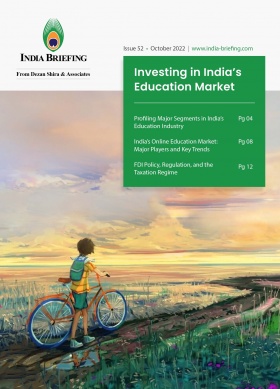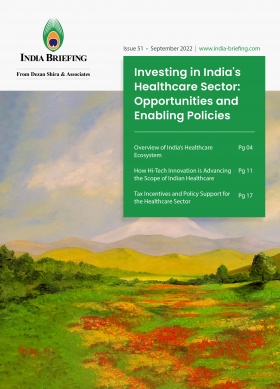India Surpasses China in M&A Fees for Western Investment Banks
For the first time ever, India generated more revenues from M&A dealmaking fees in 2022 for US and Europe-based investment banks, overtaking China. Moreover, India defied global downward trends by registering record M&A deals in the first nine months (January-September) of 2022. Factors behind India’s stellar M&A performance include a strategy of consolidation and capacity enhancement among leading conglomerates as well as the penetration of the digital economy. Meanwhile, China’s zero-tolerance COVID containment policy and US-China tensions also likely influenced foreign investment banks in relocating priorities.
As per Dealogic, a financial markets platform, large-scale foreign investment banks from western markets, such as the US and Europe, have earned US$231 million in mergers and acquisitions (M&A) fees from India so far in 2022. This was higher than their earnings from China – US$204 million – during the same period.
This is the first time that M&A advisory revenues for banks like JP Morgan in India has surpassed China, indicating a diversification of these large investment banks away from Chinese economy amid US-China decoupling trends in trade, investment, and technology.
This shift in the banking industry from China to India is very similar to the shift in the Indian technology sector, which witnessed a shift investment flow from China to India in 2021. As per data by Asian Venture Capital Journal, for every US$1 invested in Chinese tech, US$1.50 went to the Indian technology sector.
India’s exemplary M&A performance in 2022 a departure from global trends
In 2022, India emerged as the global outlier for M&A activity despite macroeconomic headwinds and the Russia-Ukraine conflict impacting global commodity markets, supply chains, inflation, etc.
As per a report by data provider Refinitiv, M&A activity in India touched an all-time high of US$148 billion in the first nine months of 2022, witnessing a surge of 58.2 percent year-on year (y-o-y). India’s domestic M&A activity soared by 190 percent in 2022 to US$105.6 billion, primarily driven by the merger of HDFC-HDFC Bank in a deal valued at US$60.4 billion, the largest Indian-involvement deal on record.
In private equity (PE)-backed M&A activity, India crossed China for the first time since 2008, accounting for 28 percent global market share in PE-backed deals. China’s market share was 24 percent during this period.
Bankers also suggested that a shift in Indian companies engaging them for initial public offering and equity issuance work played a significant role in amplifying these revenues. Earlier, when they engaged with state-owned assets that were listed for privatization, the revenues were relatively low. However, with the balance shifting towards private companies, there has been a significant jump in revenues.
Growth in big tech, buoyant cash reserves among factors behind deals
Factor like buoyant cash reserves, increasing FDI inflows, and an enabling regulatory regime have facilitated India’s upward deal momentum.
But, so has the penetration of the digital economy and corporate strategy considerations amid high-tech innovation led by start-ups. As per Jan Metzger (Citi Asia Head – Banking, Capital Markets and Advisory), “the evolution of the banking wallet there with the growth in tech, alongside the established Indian corporate titans being more active” had made India a “leading investment banking market for Citi in 2022”.
China’s COVID policy, favoring of domestic banks, decoupling from US among factors resulting in decline in M&A revenues
The major reason for the downfall in revenue is China’s zero COVID policy, which led to a complete sealing of mainland China during the pandemic.
As a result, revenue from Chinese equity and bond markets, one of the biggest sources of fees for major western investment banks in Asia, witnessed a decline in 2022. Its negative impact on the capital markets was also a consequence of perceived decoupling in trade, investment, and technology between China and the US.
Additionally, the long period of closure saw more and more Chinese companies turning to domestic banks for advisory work, which according to Wall Street bankers will likely continue going forward – even as China navigates the sudden U-turn on its zero-COVID policy from December this year.
About Us
India Briefing is produced by Dezan Shira & Associates. The firm assists foreign investors throughout Asia from offices across the world, including in Delhi and Mumbai. Readers may write to india@dezshira.com for more support on doing business in in India.
We also maintain offices or have alliance partners assisting foreign investors in Indonesia, Singapore, Vietnam, Philippines, Malaysia, Thailand, Italy, Germany, and the United States, in addition to practices in Bangladesh and Russia.
- Previous Article Uttar Pradesh’s New Industrial Policy 2022: North Indian State Seeks to Pull in More FDI
- Next Article Complete List of Beneficiaries under India’s PLI Scheme for Telecom Sector









